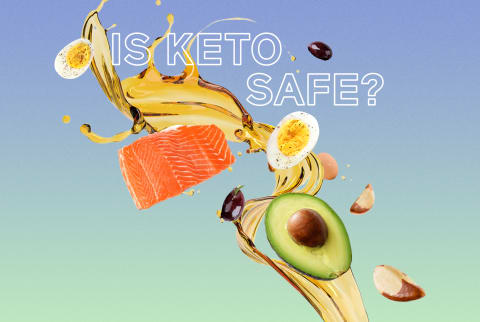Advertisement
Is The Keto Diet Actually Safe? A Doctor Weighs In


As the keto diet continues to trend, you might find yourself wondering if it's safe for everyone. The answer is—it's complicated. Before you dive into this trendy diet, give this a read.
What is ketosis?
Some of the conditions that have been successfully managed with the ketogenic diet include epilepsy, post-concussion syndrome1, obesity, type 2 diabetes, blood sugar instability (including hyperglycemia and hypoglycemia), and inflammatory conditions2. These conditions have had symptomatic improvement when the body moves from a sugar (glucose)-burning state to a fat-burning state, which is what we call ketosis.
Ketosis is a metabolic state3 where the body is primarily using fat for energy instead of carbohydrates. Burning carbohydrates or glucose for energy is the default function of the body, so if glucose is available, the body will use that first. Once the body enters a state of ketosis, the body is using ketones instead of glucose by burning fats. This is an inborn survival mechanism of the body for periods of famine. Being in a state of ketosis is safe and can provide much benefit to the neurological system and metabolic pathways of the body. People will often report sharper mental function, increased energy, better sleep, weight loss, and fewer food cravings.
What is ketoacidosis?
It's important to note the difference between nutritional ketosis and a dangerous condition called ketoacidosis. Ketosis is a natural process created within the ketogenic diet when the body shifts from a glucose-burning state to a fat-burning state. Diabetic ketoacidosis is an extremely dangerous metabolic state when the ketone levels rise to an unnaturally high level. 4This is most commonly seen in people with mismanaged type 1 diabetes. Diabetes type 1 is an autoimmune condition 5that causes the immune system to attack the beta cells of the pancreas; these are the cells that produce insulin. Damage to these cells will compromise insulin production or completely eliminate the production of insulin. If a person is unable to make insulin, they become insulin dependent and need to administer pharmacological insulin to prevent ketoacidosis.
Poor management of type 1 diabetes is one of the leading causes of ketoacidosis. In insulin-dependent diabetics, unless they inject insulin, there is no brake to stop the production of ketones. The ketones rise to dangerous levels, creating acidity in the blood, which can be life-threatening. This is not a ketogenic diet problem; this is a lack of insulin problem. This is virtually impossible in a person with a properly functioning pancreas.
Other factors that increase the risk for ketoacidosis in a person with type 1 or type 2 diabetes include developing an infection, abusing drugs or alcohol, or taking a medication that affects how your body uses sugar. For example, corticosteroids, which are used for inflammatory bowel conditions and respiratory conditions like asthma, can make it harder for your cells to use insulin. Other medications, such as diuretics, can also raise blood glucose levels.
Symptoms of diabetic ketoacidosis include:
- Excessive thirst
- Frequent urination
- Vomiting
- Weakness
- Shortness of breath
- Fruity-smelling breath
- Confusion
Important: A person in ketoacidosis needs immediate medical attention.
If you are a diabetic on the ketogenic diet, monitoring ketones is important. When your body is in ketosis, the ketones that aren't used will spill over into different areas of the body including the breath, urine, and blood. Ketone levels can range from zero to very high, and measuring them regularly can give you a good understanding of where you are in ketosis. Anything between 0.6 and 3.0 mmol is usually the optimal ketone range for someone on a keto diet6. Ketone levels during diabetic ketoacidosis can be up to five times higher than the healthy ranges for nutritional ketosis. You can access easy-to-use at-home testing kits to monitor your levels.
In establishing the safety of the ketogenic diet, insulin-dependent individuals have to be the most cautious.
Who should avoid the keto diet.
There are certain other groups that need to pay special attention to their ketogenic diet approach and may need a modified version of the keto diet. A few examples include:
People with gallbladder disease or who have had their gallbladder removed
This group needs to be cautious with their fat intake since the gallbladder plays a significant role in the breakdown of fats. It is best to consume more lean proteins such as poultry and fish. It is also best to limit fats from dairy, oils, and butters. A Mediterranean version of the keto diet is a great guideline.
People with hormonal issues
It is always best to eat organic, pasture-raised poultry, wild fish, and grass-fed red meat while on a ketogenic diet. It is especially important to eat clean sources of protein when you are struggling with hormonal imbalances since most animal protein is treated with growth hormone. The food sources of growth hormone can alter hormonal pathways in the human body.
People with gut issues
If you have a sluggish bowel [gastroparesis] or constipation, you may need to eat more easily digestible plants and protein. Consider consuming more fish protein and cooked veggies until you improve your gut function.
People who have known toxicity
Toxin exposure can be due to dental work; working in labs or with chemicals; frequent use of insecticides or other landscaping chemicals; or being exposed to black mold, certain cosmetics, and more.
In conclusion, the keto diet is very safe for most people. It can also be extremely beneficial in many conditions such as obesity, type 2 diabetes, cognitive issues, seizures, and much more. Those who are insulin dependent need to take the most care and precautions when embarking on a ketogenic diet. They must manage their insulin and monitor their ketone levels to prevent the dangerous condition called ketoacidosis. As a practicing clinician, I do see minor complications with the keto diet in select groups such as people with gallbladder disease, hormonal issues, severe gut issues, and toxicity. You can still embark on a ketogenic diet with the above conditions but will want to modify your keto diet to prevent side effects.


















